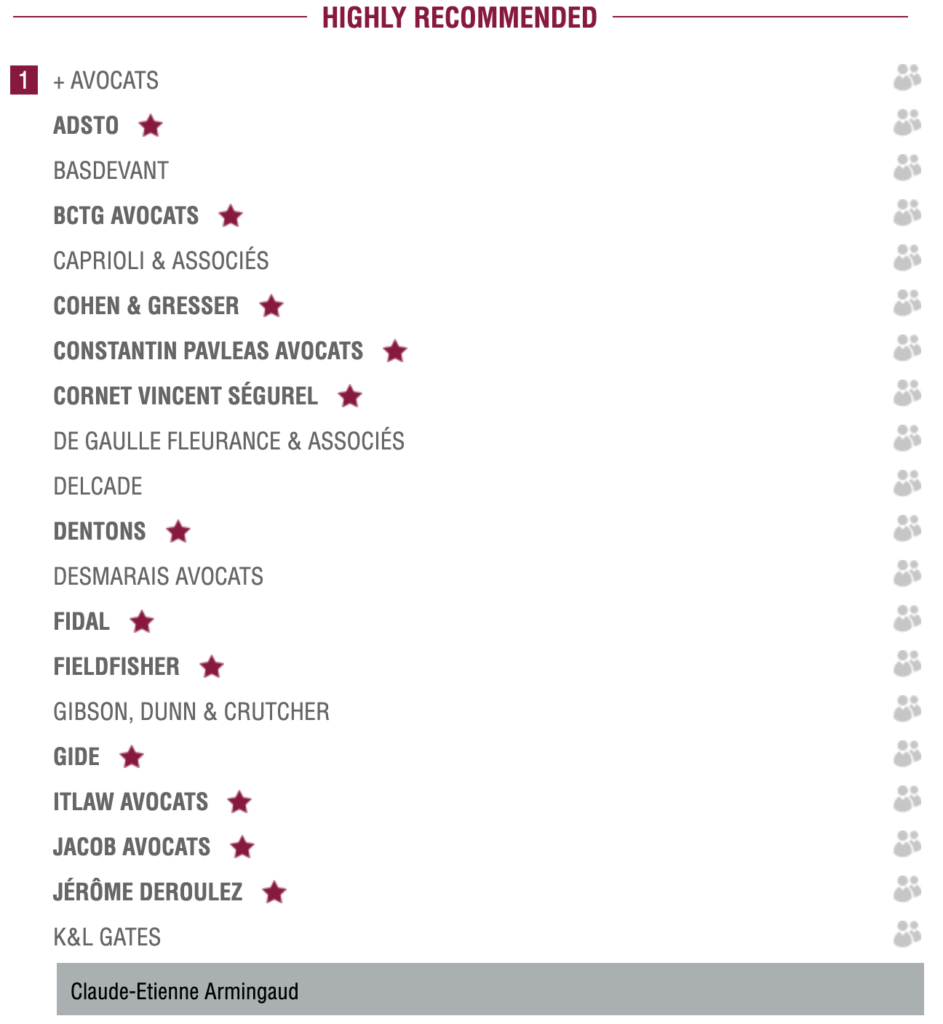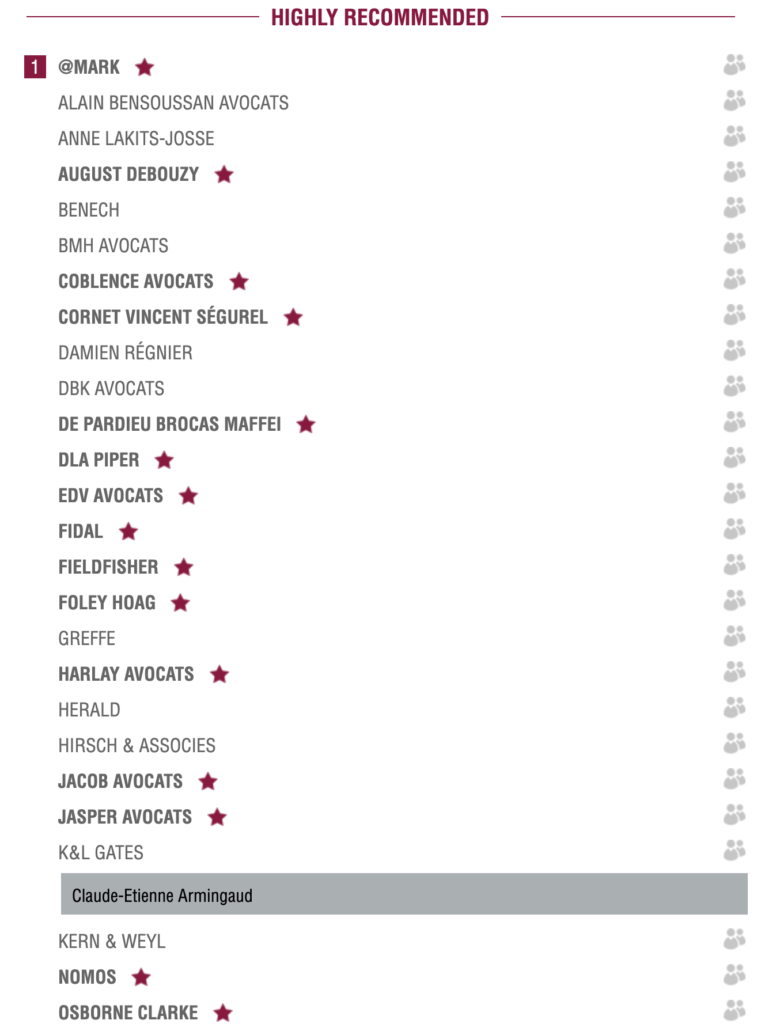Practice head(s): Claude-Etienne Armingaud
(more…)Legal 500 Rankings 2024 – Intellectual Property: Trade Marks And Designs – Tier 4
March 27th, 2024 | Posted by in Intellectual Property | Non classé | Rankings | Trademarks - (0 Comments)Leaders League Ranking 2023 – Intellectual property – Management of trademark, design and model portfolios – France
October 3rd, 2023 | Posted by in Rankings | Trademarks - (0 Comments)K&L Gates ranked “Highly Recommended 1/2” with Claude-Etienne Armingaud.
Source: Leaders League
(more…)Leaders League Ranking 2023 – Intellectual property – Trademark litigation – France
October 3rd, 2023 | Posted by in France | Intellectual Property | Rankings | Trademarks - (0 Comments)Legal 500 Rankings 2023 – Intellectual Property: Trade Marks And Designs – Tier 4 – France NEW ENTRY
April 12th, 2023 | Posted by in France | Intellectual Property | Rankings | Trademarks - (0 Comments)Practice head(s): Claude-Etienne Armingaud
Source: Legal 500
The New Digital Frontiers: How IP is adapting to virtual worlds, from NFTs to virtual products
August 24th, 2022 | Posted by in Blockchain | Intellectual Property | Trademarks - (0 Comments)Virtual products, the metaverse, and non-fungible tokens (NFTs) have recently been expanding and receiving considerable attention from investors, the general public; as well as the art world – within the span of a year, NFT-backed virtual works of art have been reaching new height, from Beeple, Everydays: The First 5000 Days (March 2021 – US$ 69.3) to The Merge (December 2021 – US$ 91.8). Today, the most valuable living artist in history is a virtual work of art author (Pak, author of The Merge).
With the rise of this new market, numerous stakeholders have tried to expand the protection of these digital creations through trademark registration before the European Union Intellectual Property Office (EUIPO) or its national counterparts in the European Union. However, they also found that the current 11th Nice Classification lacked clarity and precision on that matter. Indeed, the “virtual goods” may represent an electronic version of an existing tangible goods, but the applicants were likely to face rejection from the trademark offices, as the classification as a “good” still requires a physical embodiment.
In June 2022, the EUIPO finally addressed this issue to provide clarity, by going on the record to consider virtual products (including NFTs, or more likely the underlying virtual works to which such NFTs would be appended) as digital content or images, hence belonging to Class 9 which encompasses instruments for science or research, audio-visual and information technology equipment, as well as security and safety equipment. This new approach is part of its 2023 draft Guidelines which aims at harmonising IP practices across the EUIPO, increasing predictability and ensuring compliance, consistency and coherence.
Consequently, virtual goods and NFTs will be added to the upcoming 12th edition of the Nice Classification. However, the EUIPO rightfully considers NFTs to be certificates, distinct from the virtual element they authenticate. A specific wording has been established in the draft directive, namely “downloadable digital files authenticated by non-fungible token”, the term “non-fungible token” being deemed, in and of itself, not acceptable by EUIPO without a proper link to the underlying asset.
The EUIPO is not going to further modify this Class to address all possible situation, but advises applicants to specify which content the virtual products are referring to, e.g.“downloadable virtual products, namely virtual pieces of furniture.”
Concerning virtual services and NFTs, the actual principles are maintained and applicants need to refer to pre-established definitions.
This decision from EUIPO allows for the facilitation of virtual products and NFTs trademarks. Internal and external stakeholders have until 3 October 2022 to escalate observations on draft directives to the EUIPO.
First publication on the K&L Gates IP Blog in collaboration with Louise Bégué
Leaders League Ranking 2022 – Intellectual property – Management of trademark, design and model portfolios – France
March 8th, 2022 | Posted by in Intellectual Property | Rankings | Trademarks - (0 Comments)Leaders League Ranking 2021 – Intellectual property – Management of trademark, design and model portfolios – France
March 14th, 2021 | Posted by in Trademarks - (0 Comments)Leaders League Ranking 2021 – Intellectual property – Brands, designs, and models – France
March 14th, 2021 | Posted by in Rankings | Trademarks - (0 Comments)K&L Gates ranked “Recommended” with Claude-Etienne Armingaud.
Source: Leaders League
Legal 500 Rankings 2020 – Intellectual Property: Trademarks & Designs – Band 4
May 21st, 2020 | Posted by in Communication | France | Rankings | Trademarks - (0 Comments)Practice head:
Claude-Étienne Armingaud
Key clients
- Kookai
- Hyundai Motor Company
- Nouvel Héritage
- Nous – Concept Store
- POC
- Ravel Technology
- AR24
- Cybergun
- Canal+
Work highlights
- Assisted POC Sports with identifying and destroying counterfeit products seized by Belgian customs and implementing a successful process of customs enforcement of trade marks and intellectual property rights.
- Representing Nous Concept in the defence of its trade marks in the context of litigation and subsequent trade mark fillings.
- Assisting Jessy Séminor, a French start-up specialising in interior design, with various aspects pertaining to the development of its activities and the protection of its intangible assets and goodwill.
Source: Legal 500 – EMEA
(more…)



